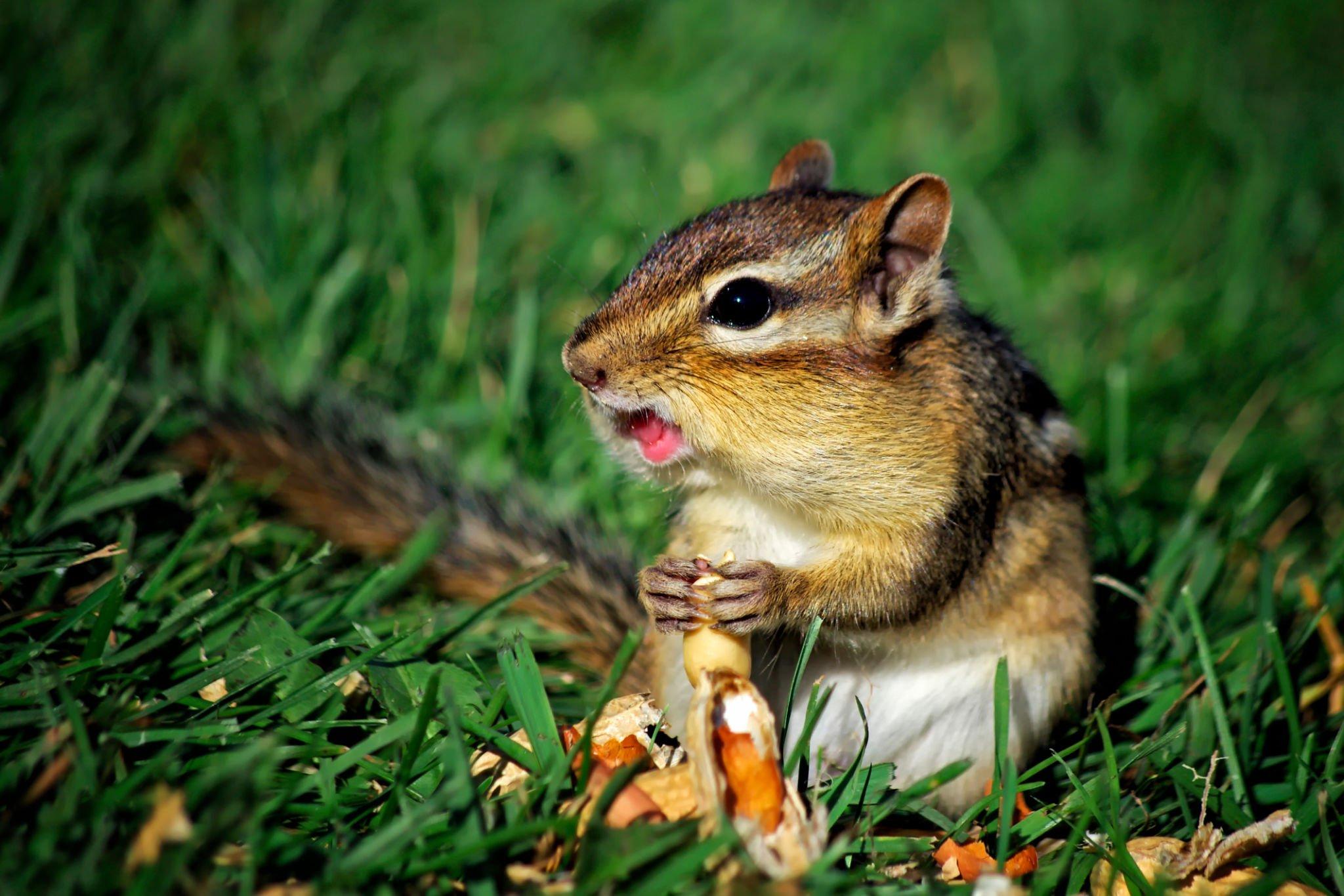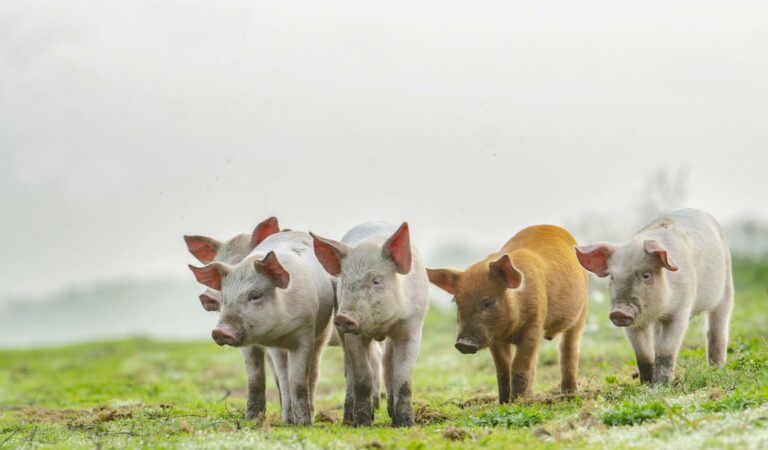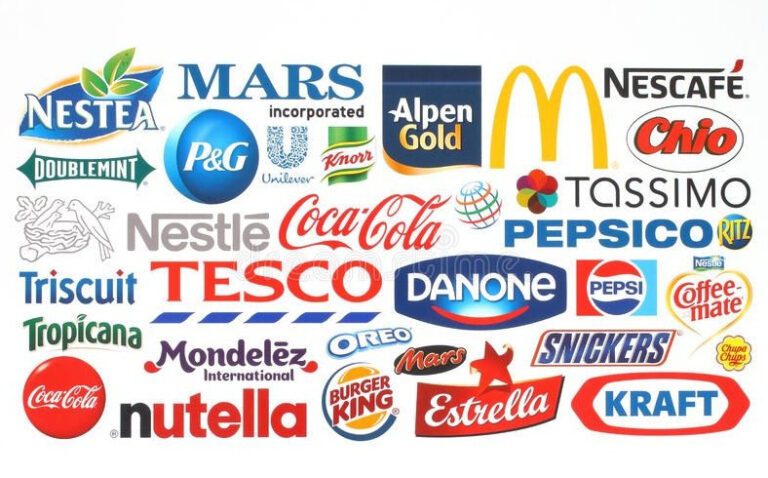Discover Chipmunks Favorite Foods: What Do These Adorable Critters Love to Eat?
Uncover the secrets of what chipmunks eat to thrive! From nuts to fruits, find out the best foods to offer these charming animals. Learn what treats to offer these adorable creatures and how to attract them to your backyard safely and responsibly!
Introduction
In addition to their animated scurrying and cheeky antics, chipmunks are often fascinating to nature enthusiasts because of their tiny size and vibrant personalities. But what really piques curiosity is their choice of food. Understanding chipmunks’ dietary habits and nutritional requirements can be accomplished through the study of their favorite food.
Chipmunks Favorite Food
Chipmunks, with their cheeky antics and speedy maneuvers, are delightful to watch, especially when they’re foraging for their favorite foods. These small, striped rodents have varied favorite foods include a selection of nuts, seeds, fruits, and more. Here’s a closer look at the foods that chipmunks are particularly fond of:
Nuts
One of the primary components of a chipmunk’s diet is nuts. These are not only nutritious but also ideal for storage:
- Acorns
- Walnuts
- Hazelnuts
- Peanuts
These nuts are favored for their high caloric content, helping chipmunks build up the energy reserves needed to survive the winter months.
Seeds
Seeds are another critical part of their diet, often stashed away in their burrows for cold seasons:
- Sunflower seeds
- Pumpkin seeds
- Sesame seeds
These are easy for chipmunks to collect and transport, and provide a great source of energy.
Fruits
Fruits are a sweet treat for chipmunks, and they particularly enjoy:
- Berries (like strawberries, raspberries, and blueberries)
- Apples
- Cherries
- Pears
These fruits are not only enjoyed fresh but are also sometimes stored, providing essential vitamins and moisture.
Vegetables
When available, chipmunks will also nibble on various vegetables, which provide them with additional nutrients:
- Carrots
- Peas
- Corn
- Squash
Insects and Other Small Proteins
Occasionally, chipmunks will supplement their diet with small amounts of protein from:
- Worms
- Small frogs
- Insects
This helps them get additional nutrients needed for reproduction and growth.
Chipmunks are particularly adept at gathering and storing food, utilizing their expandable cheek pouches to transport goods back to their burrows. Their ability to hoard vast amounts of food is crucial for their survival through winter, ensuring they have a continuous supply during scarce times. This varied diet not only sustains them but also influences their foraging behaviors, making them one of the more interesting creatures to observe in the wild or even in our backyards.
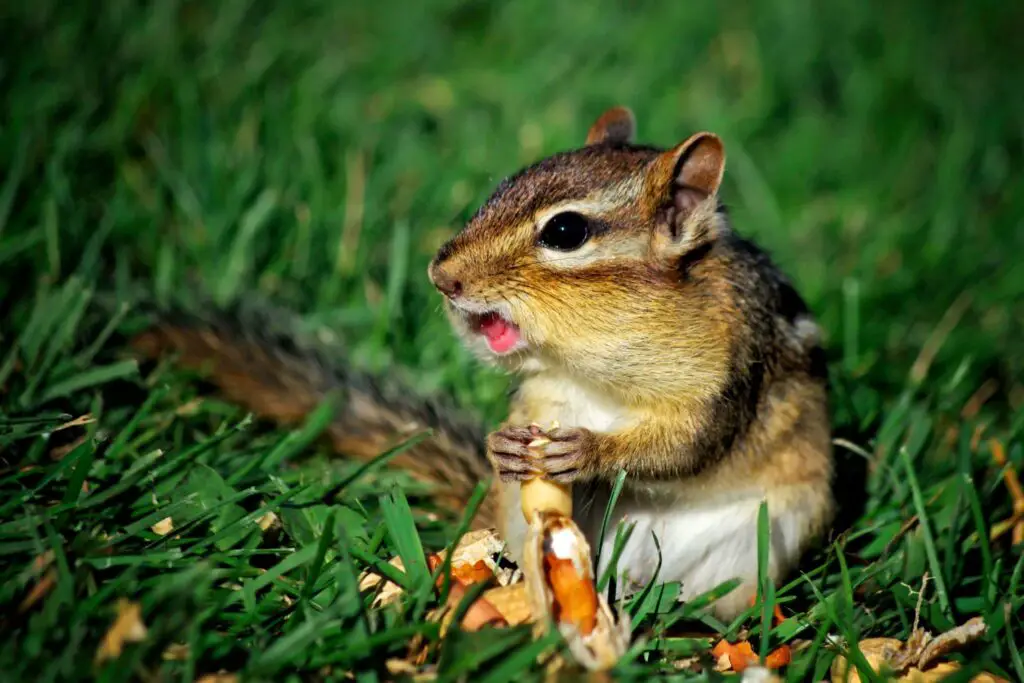
Exploring the Optimal Chipmunk Diet in More Detail
Understanding Chipmunks’ Eating Habits
The chipmunk, with its petite size and high energy levels, maintains an active lifestyle that necessitates a diet high in nutrients to satisfy their voracious appetites. Their diet choices are primarily influenced by availability and nutritional value.
Varieties of Chipmunks Favorite Foods
There are many foods that chipmunks enjoy eating, including nuts, seeds, berries, and insects. Among their top picks, almonds and walnuts rank high due to the energy-rich composition of their composition and their easy accessibility.
The Nutritional Significance of Nuts
There are many key components of a chipmunk’s diet, such as fats, proteins, and fibers. These elements are crucial to their growth, energy requirements, and immune system function.
Exploring Seeds and Their Appeal
As well as nuts, chipmunks find seeds extremely appealing. Sunflower seeds, pumpkin seeds, and chia seeds offer a delicious blend of nutrients that contribute to their overall well being.
The Allure of Berries
Berry treats provide a refreshing change, hydration, and valuable nutrients for chipmunks. Blueberries, raspberries, strawberries, and blackberries are delicious and provide nutritious benefits for chipmunks.
Insects: A Protein-Packed Choice
Insects are another intriguing component of a chipmunk’s diet. Rich in protein, insects such as mealworms and crickets provide a boost of protein that assists with muscle development and nutrition.
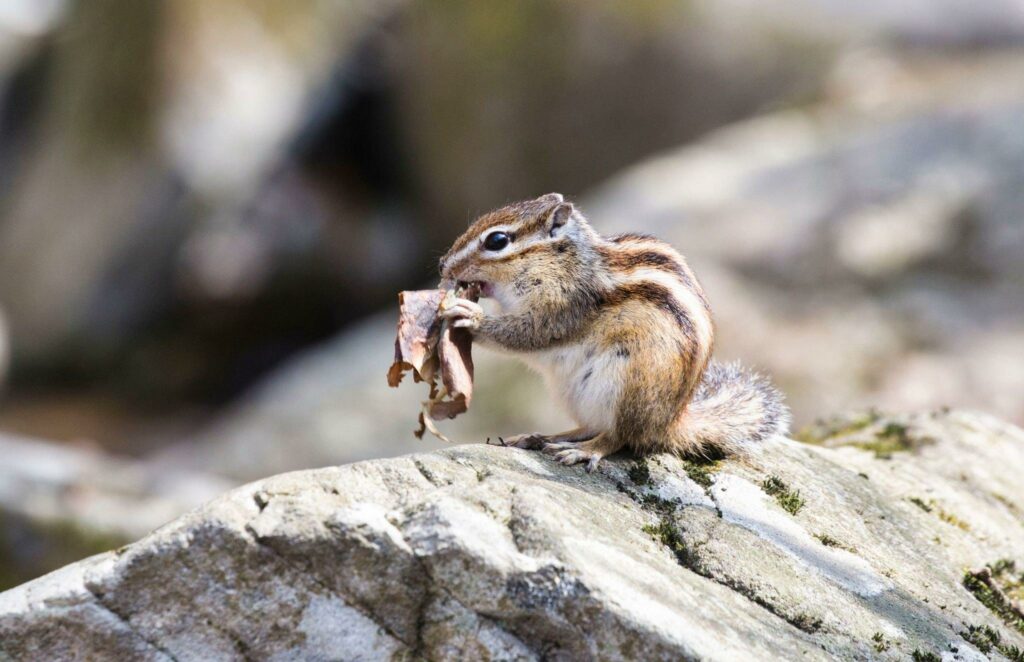
Exploring Other Dietary Preferences
Aside from the quintessential favorites, chipmunks occasionally consume fruits such as apples and grapes, as well as leafy greens that are nutritionally rich.
Attracting Chipmunks to Your Garden
To attract chipmunks into your garden, you should create an environment in which they feel at ease. Follow these tips to entice these delightful creatures into your garden:
Plant Nut-Bearing Trees
It is believed that chipmunks prefer environments rich in nut-bearing trees. Consider planting oaks, hickories, or beech trees in your yard, since these trees don’t only provide shade and beauty but also provide a natural food source for chipmunks.
Set Up Bird Feeders
A bird feeder filled with nuts and seeds can serve as a beacon for chipmunks. By strategically placing these feeders around your garden, you will be able to attract these furry foragers. Make sure you select squirrel-proof feeders to ensure the chipmunks a feast uninterrupted.
Create Sheltered Spaces
It is important to provide bushes, shrubs, or rock piles where chipmunks can find safety and shelter. A secluded and secure area will encourage them to explore and stay in your garden.
Limit Predators’ Presence
It is difficult to eliminate all predators from your garden, but minimizing the open spaces where predators like cats or larger birds may lurk can result in a safer environment for chipmunks.
Maintain a Clean Environment
Clean your garden space regularly, removing clutter and debris. Maintaining a well-maintained area will not only encourage chipmunks to explore and forage but also ensures they feel comfortable.
You can transform your garden into an attractive haven for chipmunks by implementing these simple yet effective strategies. Experiencing these playful creatures in the midst of your greenery adds an element of natural beauty and delight to your garden.
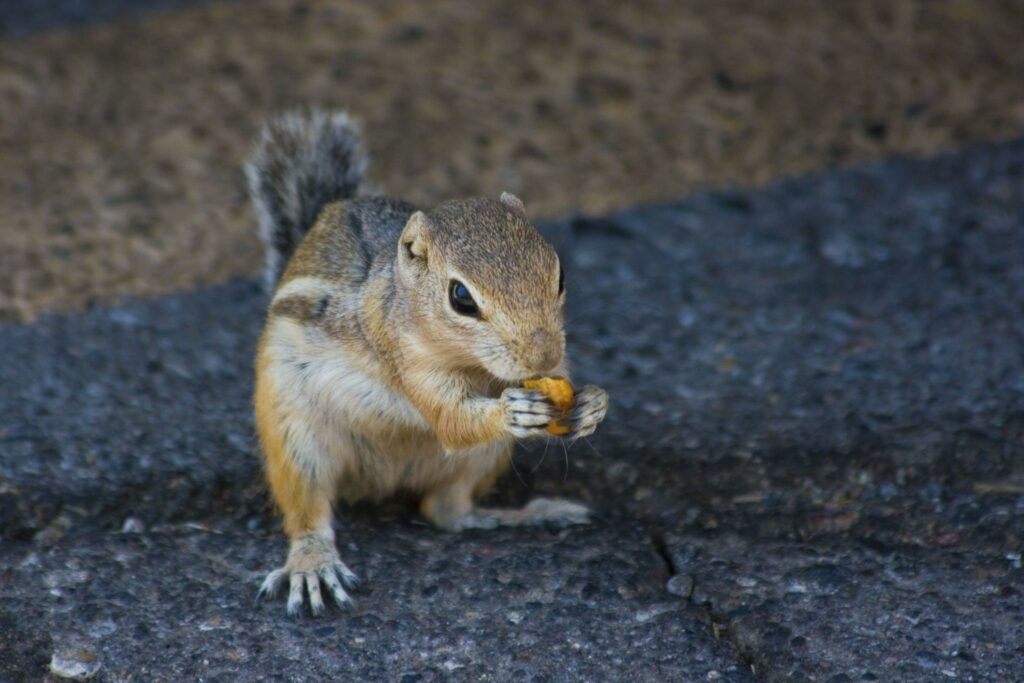
Human Interaction and Chipmunk Feeding
As a result of their adorable appearance and curious nature, chipmunks often draw our attention, leading us to interact with and even feed them. Although the idea seems endearing, it is essential to understand the impact of human interaction and feeding practices on these tiny creatures.
Understanding the Risks
It is possible to establish a bond between humans and wildlife by feeding chipmunks. However, this interaction is not without its set of risks.
Risks of Human Foods
In spite of the fact that human foods appear harmless to chipmunks, they can pose significant health risks to them. Processed snacks, high in salt and sugar, can disrupt their natural diet and result in health complications. If consumed regularly, these foods can result in obesity, dental problems, and even digestive problems.
Impact on Natural Behavior
Human interaction and feeding might alter chipmunks’ natural behavior. They might become accustomed to relying on human-provided food, disrupting their instincts and possibly causing dependency. A change in behavior could adversely affect their natural habitat and ecosystem, reducing their chances of surviving in the wild.
FAQs
Do chipmunks eat insects?
There is no doubt that chipmunks eat insects. However, the majority of the food they consume consists of nuts, seeds, and fruits, which constitute the majority of the diets of chipmunks.
What fruits do chipmunks enjoy?
A chipmunk’s favorite food is berries, cherries, and apples as they are sweet, and therefore a favorite food of chipmunks.
How can I attract chipmunks to my garden?
There are a few simple things you can do to attract chipmunks to your garden, including planting nut-bearing trees and putting out bird feeders stocked with nuts and seeds.
Are vegetables a part of a chipmunk’s diet?
Although they do not eat vegetables as a primary food item, chipmunks sometimes nibble on vegetables such as carrots and leafy greens on a regular basis.
Can chipmunks eat nuts like walnuts and hazelnuts?
I agree that chipmunks are known to enjoy nuts like walnuts, hazelnuts, and acorns, which are essential parts of their diet and provide them with the energy they need to survive.
What role do nuts play in a chipmunk’s survival?
As a source of nutrition, nuts are one of the most important food sources for chipmunks, especially during the cold months when they require more energy to survive.
Conclusion
By understanding the varied diet preferences of chipmunks, we will be able to better understand their nutritional requirements and adaptability. There are various nutrients, seeds, berries, insects, and sometimes even fruits and greens that provide these enchanting creatures with the nutrition necessary to thrive in their natural habitats. They are a smorgasbord that keeps them going and alive in their natural habitat.

